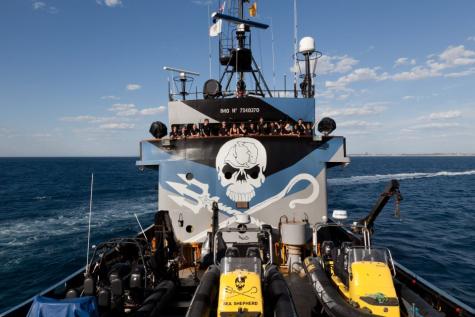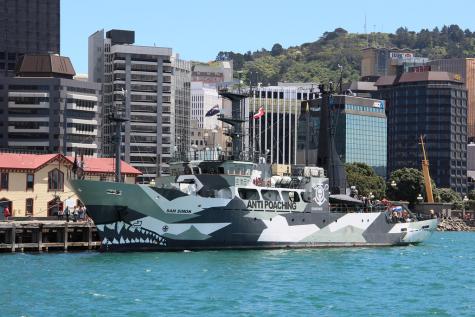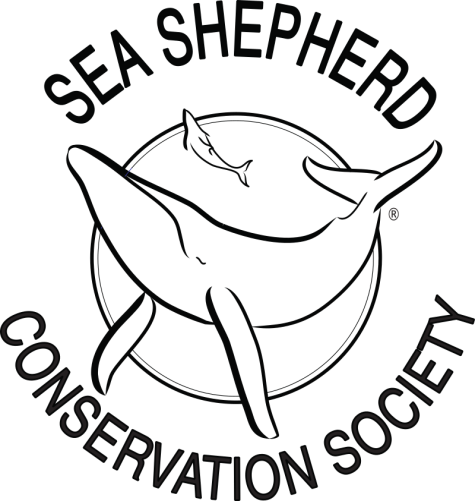Sea Shepherd - Protecting Marine Wildlife Worldwide

Sea Shepherd Conservation Society – Pirate Advocates of the High Seas
Sea Shepherd is an international non-profit marine conservation organisation that engages in direct action campaigns for the protection of marine wildlife worldwide. They were founded in 1977 by Captain Paul Watson, a former member of Greenpeace.
There are 15 Sea Shepherd chapters around the world, with Sea Shepherd Global being the largest. Their fleet currently consists of 10 ships and several smaller boats.
The organisation is predominantly ran by dedicated volunteers. The group has been funded over the years by a host of celebrity sponsors and high-profile animal rights activists including Bob Barker, Doug Tompkins, Ady Gill, Bridget Bardot, Mick Jagger, Pierce Brosnan, Sean Penn, and many others.
The main goals of Sea Shepherd are:
-
Defend ocean wildlife from poaching, unsustainable fishing, habitat destruction, and captivity.
-
Protect marine habitats and maintain a balanced ecosystem free from pollution, destructive fishing gear, plastic, and marine debris.
-
Uphold international laws and agreements by supporting law enforcement agencies to bring justice to poachers and illegal fishing activity.
The protection of whales is a key priority for the Sea Shepherds. Commercial whaling was banned in 1986 however still continues under the radar of the authorities. Since this ban, Japan, Norway, and Iceland have killed 40,000 whales often under the guise of ‘scientific research’.
Despite the known barbarity of whale harpooning there still exists a demand for whale meat, and their oil, blubber, and cartilage which is used in pharmaceuticals and homeopathic medicines with no proven health benefits.

Recommended Sea Shepherd Documentaries
The Sea Shepherds are the focus of a series of eye-opening documentaries that help to raise awareness, highlight the severity of the situation, and capture the progress of their excellent work.
A thrilling documentary featuring the 110-day pursuit of rogue fishing vessel Thunder wanted by Interpol for illegal toothfish poaching in the Southern Ocean. The longest chase in maritime history encountered storms and freezing conditions across three oceans until the ship's captain deliberately sunk the ship in an attempt to destroy evidence.
A documentary featuring Sea Shepherd's Operation Albacore on board the M/V Bob Barker where alongside the Gabonese military and government they worked to stop illegal fishing off the coast of West Africa.
Sea Shepherd's diverse crew of dedicated volunteers are filmed sharing in their own words, why they literally put their lives on the line to enforce international conservation law against the illegal fishing industry.
-
Whale Wars (TV Series)
Limited series highlighting the shocking and dangerous world of the controversial Japanese whaling trade and the tactics that the Sea Shepherd Conservation Society use to cripple it.

Sea Shepherd Controversies
The innovative direct-action tactics employed by the Sea Shepherds have received mixed attention for their controversial, high-risk, and confrontational nature.
Tactics used in the past to varying degrees of success, include the use of ships to physically block illegal fishing vessels and harpoons, paintballing ships, throwing butyric acid onto ships, disabling ships at harbour, net cutting, ramming ships, using emergency flares as smoke bombs, boarding ships, and ensnaring ship propellers - all with the intent to disturb and interfere with illegal operations.
After years of clashes at sea, the U.S. court of appeal declared the Sea Shepherd organisation ‘pirates’ and upheld an injunction in 2013 barring them from targeting or attacking whaling ships from Japan’s Institute of Cetacean Research in the Southern Ocean. They were then ordered to pay $2.55 million for breaching this injunction.
Since the departure of Captain Paul Watson, the organisation has begun to change its course and steer away from the aggressive nonviolent approach of the past. Going forward they are committed to adhering to international maritime law and shift their focus to scientific research and governmental collaboration.
This change in trajectory led to Watson separating from the organisation he started. He has since created the Captain Paul Watson Foundation which will remain committed to his direct-action approach he believes is necessary to be successful in combatting the rampant illegal activity taking place in our seas.

Sea Shepherd Success Stories
Whether you agree with their tactics or not, the organisation gets results. Their nonviolent direct actions have drawn international media attention to the plight of marine animals and the large-scale illegal activities which operate unabated.
The debate on how far is too far when it comes to protecting endangered species continues, but you can't argue with positive results.
Over its decades-long history, Sea Shepherd has been credited with saving thousands of marine animals. Notable achievements include the shutdown of illegal whaling operations in the Southern Ocean Whale Sanctuary, where their interventions significantly reduced the number of whales killed by Japanese whalers.
They successfully combated illegal fishing in the Galapagos Marine Reserve and the Vaquita Refuge in the Gulf of California, contributing to the protection of critically endangered species such as the vaquita porpoise.
As part of the Monachus Campaign they confiscated over 7,500 illegal octopus fishing pots from the waters off the Arcipelago Toscano National Park, the largest seizure of octopus fishing traps ever in Mediterranean Sea.
Sea Shepherd's work in Gabon to combat illegal fishing in marine protected areas was featured in Sir David Attenborough's 'A Perfect Planet'.
Sea Shepherd has partnered with ‘LessonUp’ to create a channel of free resources for teachers and students on marine conservation, illegal fishing, and plastic pollution.
How can you Support or Get Involved with Sea Shepherd?
Individuals and organisations can support Sea Shepherd by donating funds, becoming a member, or purchasing merchandise from their official store which directly funds their campaigns. Additionally, those interested can volunteer to work on board their ships or participate in land-based activities.
Sea Shepherd also offers internships and educational programs to spread awareness and train the next generation of marine conservationists. Engaging in ocean advocacy and spreading the word about Sea Shepherd's missions and successes can also significantly aid their cause.
Author: Rachael Mellor 13.06.24 licensed under CC BY-ND 4.0
For further reading on Sea Shepherd see below ⬇️
- Sea Shepherd (Official)400941
- TV Series: Whale Wars - IMDb, 2008400943
- Sea Sheperd - Become an ocean warrior400980
- Sea Sheperd - Stop the Plunder, End the Krill Crisis400981
- LessonUp Teaching Resources - Sea Shepherd 420593
- YouTube - Sea Sheperd400996
- YouTube - Whale Wars400955
- @seashepherd400979
- @CaptPaulWatson400983
- @SeaShepherdSSCS400984
- Instagram400960
- Guardian400997
- Independent400998
- Sea Shepherd Conservation Society - Wikipedia400995
- Whale Wars - Wikipedia400942
- Paul Watson - Wikipedia400945
- MV Brigitte Bardot - Wikipedia400985
- Brigitte Bardot - Wikipedia400986
- MY Bob Barker - Wikipedia400987
- Bob Barker - Wikipedia400990
- Neptune's Navy - Wikipedia400988
- #FreePaulWatson441980
- 'Prison helped our cause': Sea Shepherd's Paul Watson plans next steps in France - RFI 18.12.24446752
- Japan 'regrets' release of anti-whaling activist Watson - France24 18.12.24446754
- Denmark will not extradite anti-whaling activist Watson to Japan - France24 17.12.24446753
- Statement on the Release of Paul Watson - Sea Shepherd 17.12.24446747
- Sea Shepherd founder Paul Watson released from detention in Greenland, avoids extradition to Japan - abc News 17.12.24446751
- Tweet: Would you dive under the ship? Discarded fishing gear affects everything- even us. - @SeaShepherdSSCS 15.12.24446748
- Tweet: This is an example of fishermen, who may not realize they’re fishing illegally, abandon their fishing gear to avoid fines or arrest once they see us coming. - @SeaShep…446750
- Don’t Wait: Triple Your Impact to Defend the Oceans by December 31 - Sea Shepherd 11.12.24446749
- Tweet: This year, three whales were killed by the destructive Antarctic krill fleets. These deaths leave us no choice but to return, again. But we can’t do it without you. - …446746
- Iceland and the Faroe Islands: Europe’s Last Bastions of Cetacean Slaughter - Sea Shepherd 20.11.24441976
- Tweet: This is why commercial fishing has its problems - @SeaShepherdSSCS 19.11.24441975
- Sea Shepherd founder Captain Paul Watson to remain in detention in Greenland amid extradition push from Japan - RNZ 14.11.24441974
- Dolphins Exhaling Plastic: A Call to Protect Our Oceans - Sea Shepherd 13.11.24441973
- Sea Shepherd founder Captain Paul Watson to remain in detention in Greenland amid extradition push from Japan - abc News 13.11.24441978
- Sea Shepherd Recovers Over 6,500 Illegal Octopus Traps in Greece’s Thracian Sea - Sea Shepherd 12.11.24441977
- Tweet: Over 6,500 illegal octopus traps and 52,000 meters of rope were removed from Greece’s Thracian Sea! Our crew rescued 571 octopuses & reduced #plasticpollution to prote…441972
- Tweet: Need some good news? We assisted rescatedelobosmarinos entangle a local sea lion. It's a reminder to support locals in their fight to save our oceans. - @SeaShepherdSS…441979
- Tweet: We’re in the thick of it—welding, painting, and gearing up for the next mission of the #AgeOfUnion. Here’s a glimpse of what it takes to keep us ocean-ready! - @seashe…439691
- Tweet: Embrace the future with hope, where each step leads to greater well-being, peace, and possibility. Every sunrise is a reminder that today brings fresh chances to grow,…439694
- Dead and injured humpback whales found in krill fishing nets near Antarctica, report reveals - abc News 01.11.24439692
- Recent whale deaths highlight risks from Antarctica's booming krill fishery - Independent 30.10.24439693
- Two Giant Nets Pulled in a Day to Protect the Vaquita - Sea Shepherd 28.10.24437162
- Tweet: A historic vote is underway at the #CCAMLR meeting to establish an MPA along the Antarctic Peninsula.This action is key to curbing krill fishing that depletes vital fo…437166
- Anti-whaling activist Paul Watson's extradition process further delayed - Euronews 24.10.24437165
- Video: Protesters In Paris Demand Release Of Sea Shepherd Founder Paul Watson - WION 24.10.24437164
- A Crucial Vote to Protect Antarctica’s Future - Sea Shepherd 24.10.24437163
- Tweet: Every fishing vessel leaves a mark—some just hide it better. While we can’t stop legal operations, we can track their impact and help arrest those crossing the line. -…437167
- Global Biodiversity in Crisis: How Sea Shepherd is Contributing to the Solution - Sea Shepherd 18.10.24435970
- Tweet: We’re a surly, salty crew. We’re not just working hard—we’re forging bonds that will last a lifetime. - @SeaShepherdSSCS 18.10.24435968
- Tweet: Sea Shepherd founder Paul Watson faces extradition from Denmark to Japan for an alleged attack on a whaling vessel 12 years ago. - @euronews 17.10.24435967
- Anti-whaling activist held in Greenland appeals for political asylum in France - Guardian 16.10.24435969
- Anti-whaling activist Paul Watson has requested political asylum from France - RFI 16.10.24435966
- Sea Shepherd Italy Launches a Bold New Campaign to Defend the Cinque Terre Marine Sanctuary - Sea Shepherd 09.10.24435973
- Tweet: Sea Shepherd Italy is fighting to protect a vital marine sanctuary! Known for its beauty, #CinqueTerre is also home to incredible marine life. - @seashepherd 09.10.24435972
- Danish Food Critic and Film Star Reported to the Police for Alleged Animal Cruelty - Sea Shepherd 27.09.24435971
- "Heart-Wrenching Cries on the Shore": Tourists Witness Faroes Dolphin Slaughter Sea Shepherd Global 14.09.24433448
- Inside Taiji’s Killing Cove: A Personal Account from Sea Shepherd’s CEO - Shepherd Global 12.09.24433450
- Japan demands Denmark extradite Sea Shepherd founder Paul Watson over whale hunting clash - SCMP 06.09.24433447
- Sea Shepherd founder Paul Watson says Japan seeking to make an example of him - Guardian 02.09.24433449
- Tweet: The #Faroese Grind is crueler than they admit. New research shows that, despite official claims, the "instantaneous" killing method leaves whales paralyzed but conscio…433451
- Anti-whaling activist to stay in Greenland jail while extradition decided - Guardian 15.08.24428205
- Anti-whaling activist Paul Watson could face up to 15 years’ prison in Japan if convicted - Guardian 31.07.24425898
- Anti-Whaling Activist Paul Watson Arrested in Greenland, May Face Extradition to Japan - CD 22.07.24424454
- Prominent anti-whaling activist detained in Greenland at Japan’s request - Al Jazeera 22.07.24424398
- Interview: Sea Shepherd Founder Paul Watson's Eco-Warrior Journey: Reveals All Book 'Hitman for the Kindness Club' - Conservation Mag 18.06.24419976
- Video: 2024 Sea Shepherd State of the Ocean Briefing - Sea Shepherd 18.06.24419972
- Paul Watson has his say on Sea Shepherd ousting - Echo 22.04.24419974
- Victory for Sea Shepherd France in the Paris court against Sea Shepherd Global on all counts - Neptune's Pirates 20.03.24419975
- Sea Shepherd intercepts six supertrawlers in Antarctica - Sea Shepherd 26.01.24419973
- From Pirate to Partner: Sea Shepherd’s Evolution in Maritime Conservation and the Pursuit of High Seas Legitimacy - Miami Law, 2024419988
- 20 Things You Must Know About The Sea Shepherds - Marine Insight 13.03.23401004
- Irregular warfare podcast: The cod wars, Sea Shepherd, and irregular warfare at sea - MWI 11.03.23401007
- Bob Brown Foundation, Sea Shepherd Global say krill super trawlers 'ploughing' through whale pods - ABC 10.03.23401009
- Ocean Defense NGO Sea Shepherd torn apart - Le Monde 14.02.23401001
- A win for endangered species: Sea Shepherd lawsuit succeeds in protecting maui dolphins - Sea Sheperd 08.12.22401014
- Eco-warrior Paul Watson, Scourge of Whalers, Returns to the Seas - VOA 24.11.22400944
- The last pirate: Paul Watson splits with Sea Shepherd - Saturday Paper 15.10.22419989
- Can former pirates help scientists study troubled waters? - Science 30.06.22419990
- Sea Shepherd and Mexico Boost Efforts to Protect Vaquita, But Is It Enough? - Ecowatch 28.04.22401012
- Video: Trailer for Chasing Thunder - Sea Sheperd 30.07.21400992
- ‘It was sink or turn yourself in’: behind a dangerous 10,000-mile ocean pursuit - Guardian 09.06.21400991
- Can hardline activists Sea Shepherd have an impact in Southeast Asia? - Eco Business 10.02.20401011
- Sea Shepherd removes over 1,000 pieces of illegal fishing gear from Vaquita habitat - Sea Sheperd 31.12.19401008
- Sea Shepherd Captain Paul Watson: 'I call what we do aggressive non-violence' - Guardian 26.07.19401015
- Ocean Warriors Chasing the Thunder - Trailer (2019)420592
- Pirate Fishing Tycoon Hit with €8.2 Million Fine in Spain - Sea Sheperd 17.04.18400994
- Documentary: Part-time Heroes (2018)420591
- Sea Shepherd to stop intercepting Japanese whaling vessels - BBC 29.08.17401006
- Sea Shepherd permanently abandons Antarctic whale wars with Japanese boats - ABC 28.08.17400946
- Top Ten Misconceptions About Sea Shepherd - Maritime Executive 15.04.17401010
- Documentary: Sea Life Savers (2017)420590
- Can Sea Shepherd survive its own success? - Guardian 05.06.15400947
- Sea Shepherd to spend $12m award on 'dream ship' to patrol Southern Ocean - Guardian 27.01.15401013
- Beyond Whale Wars: Inside Sea Shepherd’s Global Movement Defending Diversity in the Oceans - One Green Planet 13.05.14400959
- Book: Catching Thunder: The True Story of the World’s Longest Sea Chase - Eskil Engdal, Kjetil Sæter, 2014400993
- Not Their Whale War Anymore: How Animal Planet Was Forced to Step Down - Atlantic 12.12.13400952
- Whale-war fugitive: Q&A with Paul Watson - New Yorker 04.06.13400954
- Politics at play in Sea Shepherd-Japan whaling wars - BBC 01.03.13400957